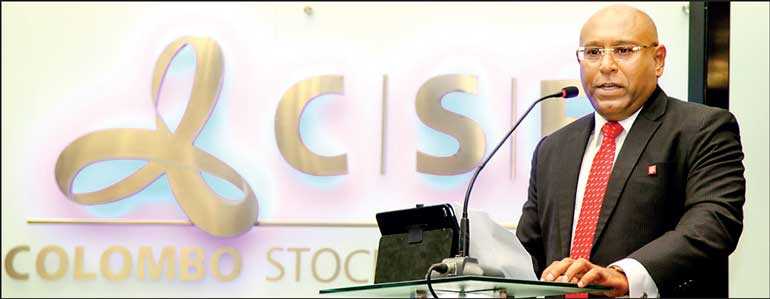Saturday Feb 21, 2026
Saturday Feb 21, 2026
Wednesday, 18 September 2019 00:00 - - {{hitsCtrl.values.hits}}

By Charumini de Silva
NDB Bank Plc yesterday said that the banking sector would face further increases in Non-Performing Loans (NPLs) this year as the macro-economic environment remained difficult.
“Indications in the banking sector show that NPLs are still growing as a result of the slow economic growth seen in the country during the past two years,” NDB Director and Group CEO Dimantha Seneviratne told journalists on the sidelines of the market opening ceremony organised by the Colombo Stock Exchange to mark its 40th anniversary yesterday.
He said the reason behind the rising NPL ratio of the entire banking industry was due to the stagnating economy where borrowers found it difficult to service their loans as expected which resulted in those loans being transferred to NPLs.
Although NDB’s performance is better than the industry average, Seneviratne said they were also faced with the same situation. “Our NPL ratio is around 4.6% as against the 4.8% industry average. Despite the fact that our NPL is lower than the industry, we are also seeing a growth in the NPLs,” he added.
He said the bank had now taken a couple of steps, including strengthening of underwriting standards, assisting customers in difficult situations for genuine reasons and enhancing recovery efforts, to retaliate against the rising NPL ratio.
Seneviratne also said that they expected an overall loan growth of 10% to 12% for the full year. As at June, NDB recorded a 5% annualised growth rate.
“In terms of loan growth, we are performing better than the industry. However, we are very concerned about what sort of assets we book and that is why underwriting standards are very high at the moment,” he stressed.
He said NDB would also raise capital within the next six months to meet equity requirements and to support future growth.
“As at June we crossed Rs. 490 billion assets and now we are on the threshold of making Rs. 500 billion. We have capital raising plans, which we are currently working out, most likely through certain private placement arrangements to raise the equity that is needed,” Seneviratne said.
He said they were working out a couple of options to raise capital, including looking at foreign investors, within the next six months.
However, he declined to disclose the amount the bank expected to raise, noting it was too early.
With regard to policy rates, the NDB Group CEO noted that banks had very little choice. “When the deposit rates are capped, we have to follow that direction and accordingly reduce the rates. I don’t think it is politically driven, but having seen the broader economic situation the policymakers have to do certain things forcefully. That is what is happening. We as banks follow those directions,” he emphasised. It was pointed out that the indications from the Central Bank were that lending rates must come down. “When you look at the growth rate of the country, it is less than 3% and inflation level is around 4% and when you have the interest rates around 14-15% I don’t think it will help the economy to grow. In this backdrop the policymakers are directing to bring the rates down and I think that is something sensible, but whether we can hold that on for a long time, even the exchange tight as well, is something we have to be mindful of,” Seneviratne pointed out.
“When GDP is below par, naturally that is reflected in the industry. Banking is the major propelling activity in economic development. When GDP is low, as a result the opportunities for banks are also low. You cannot hold us down. We are like a bouncing ball, we will come up again. You can’t keep us pressed down. This is just short term. There are lots of opportunities and we will bounce back on them.”
Pix by Chamila Karunarathna